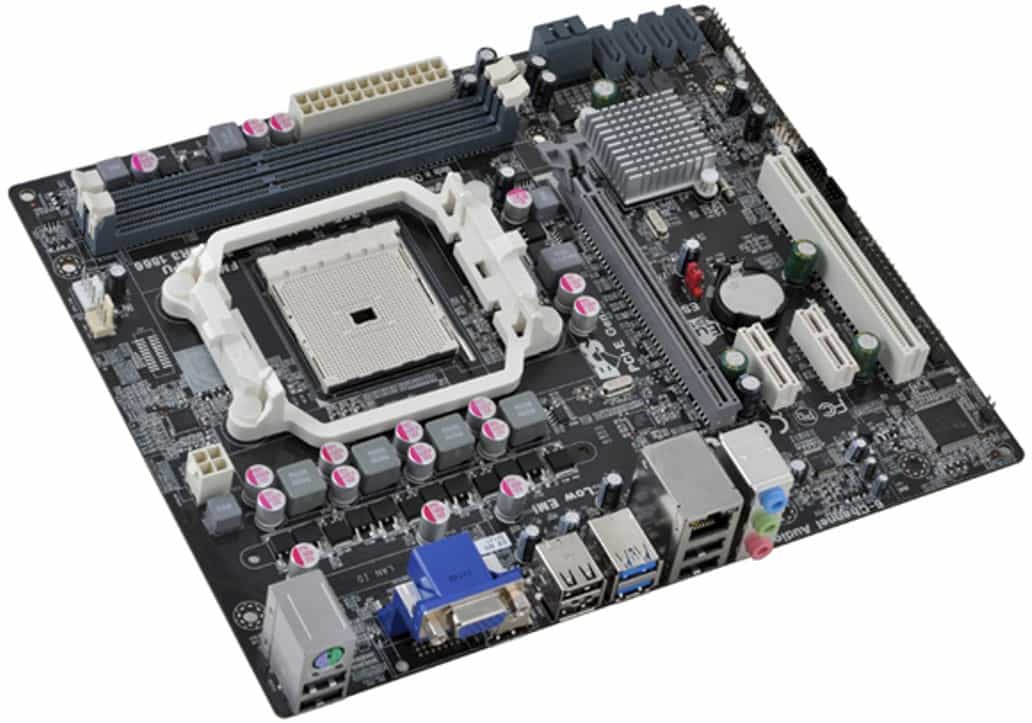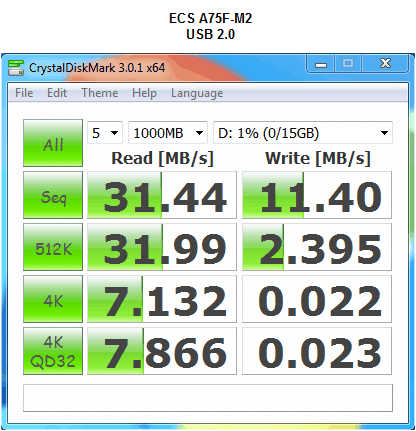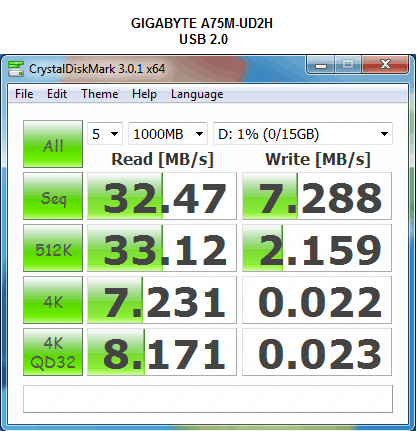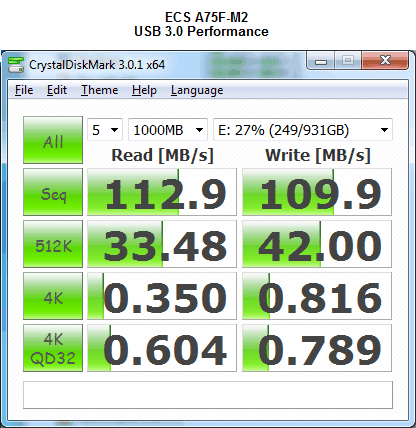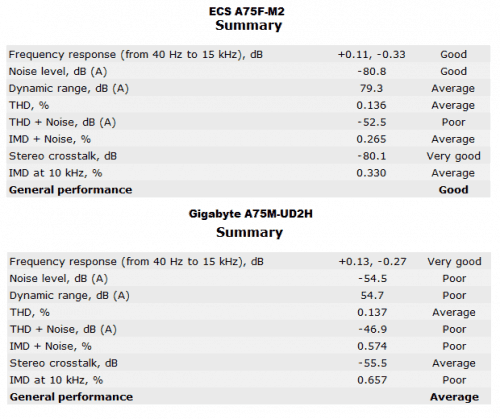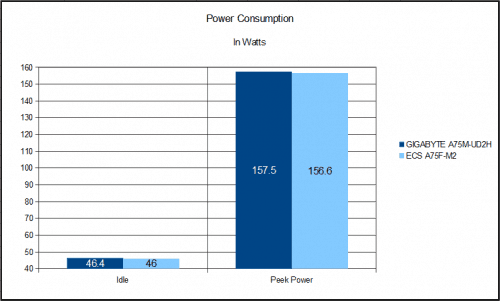CrystalDiskMark 3.0.1 – USB 2.0 Performance
Next up is the USB 2.0 testing using the same software as the SATA tests. Since neither of these boards use additional control chips or use USB lanes to connect integrate components like bluetooth, I expect these test will be nothing special.
Regardless of which drivers, the ECS A75F-M2 USB 2.0 performance is always within the same range. There are spikes up and down using the GIGABYTE A75M as a baseline. The only standout result was the Sequential write speed test where the A75F-M2 holds a 4 MB/s lead or 56.4% faster.
CrystalDiskMark 3.0.1 – USB 3.0 Performance
In this test I will be using a mechanical HDD in a Rosewill USB 3.0 enclosure. If this is working as it should, the HDD should be the limiting factor and performance should be similar to the SATA performance.
As you can see the performance of the 7200 RPM Samsung F3 drive is working at full speed. The inclusion of the USB 3.0 ports a welcome addition to the 6 USB 2.0 ports on the back panel. The results were within 1 or 2MB/s of the GIGABYTE in our original review but the GIGABYTE adds over 9MB/s in the 512K write tests and slightly better performance in 4K tests. This is again due in part to the lack of up to date drivers on the ECS site in support of this board.
RightMark Audio Analyzer 6.2.3 – Audio Performance
This test will compare the on-board audio codecs of each system. Here the ECS A75F-M2 is using a 6-channel audio solution compared to the A75M-UD2H 8-channel solution. The M2 is almost a full 2 inches shorter in size. The form factor can affect how many audio capacitors you can put on the motherboard, and this could affect it further.
I am surprised to see the audio quality is better on the ECS board. The Realtek ALC662 on the A75F-M2 is designed to run 6 channels, but runs only 4 channels (2 fronts and 2 side speakers) by default. If you have no need for a microphone, you can use the Realtek software to re-purpose the mic jack to run those last 2 channels and get your full 6-channels or change the purpose of the side speaker jack to center/sub for 3.1 surround sound.
While the audio options are limited, I do like the flexibility the Realtek software provides. This also makes the ECS a slightly better option for non multi-channel applications.
Power Consumption
The slightly lower power consumption when compared to the GIGABYTE A75M-UD2H is not because this board is more efficient. It is because there are less components. Two less RAM slots, thee fewer capacitors for audio, fewer MOSFETS, etc. I think the difference in power use for these two boards would vary more if I used 4 RAM sticks in the UD2H. Either way, the difference is negligible. As the power use is very close to the GIGABYTE A75M-UD2H, you can find more power consumption results in my A8-3850/A6-3650 APU review.
Final Thoughts
The primary issues I have with the ECS A75F-M2 are the complete lack of overclocking, no DVI output, and lack of features beyond what AMDs APU and Hudson FCH provide. The board would be great for a business who buys in bulk (since their engineers have very few ways to mess up).
The A75F-M2 has an MSRP $72.99 and I wish I could say it was the cheapest A75 based APU motherboard, but its not the case. The ASRock A75M-HVS is cheaper, has 3 fan headers, one less PCI x1 slot, but a few more features such as a UEFI graphical BIOS. But the A75F-M2 does bring good sound quality to the table for those using up to a 3.1 speaker configurations. There is also some clear thought in the design and layout of this board. I was glad to see they took the time to clear the area behind the CPU if you buy an aftermarket cooler to ensure shorts are impossible with a metal backplates. On that note, it was disappointing to see the use of plastic pins in lieu of a backplate. Especially since the area directly above it is so well configured to house something sturdier.
There is nothing truly bad about this board. But the real disappointment is the lack of proper overclocking options. Practically every other A75 based motherboard offers more features and overclocking support. The $10 difference in price between this board and more feature rich options is negated by having to spend more on the APU since the latter is missing. I can’t recommend this board as every other A75 FM1 socket motherboard including ones from ECS like the A75F-A are just a better value for individual consumers. However, the A75F-M2 is a solid, well designed product. It’s a shame it adds nothing special to its name.
Pros
- Shorter design easier to work with in Small Micro ATX Cases
- Good on-board sound quality
- Great User Manual
Cons
- Re-purposed, outdated BIOS
- No overclocking Options
- Outdated drivers on ECS site
- Lack of ECS brand features
Overall Rating: 7.0 / 10.0
Help Us Improve Our Reviews by Leaving a Comment Below!

